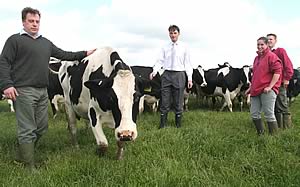 |
|||||||||
|
|||||||||||||||||||
Dairy Group Chairman Calls on Government to Act Now on Bovine TB Crisis 01/06/07 Cases of bovine tuberculosis in Shropshire are rampaging out of control at the moment, according to local MP Daniel Kawczynski, raising serious issues of animal welfare as well as threatening farm livelihoods. He is calling for decisive political action from the Government’s Department for Environment, Food and Rural Affairs (DEFRA).
Mr Kawczynski this week visited the 500 acre dairy and mixed farm in Westbury at the southern end of his Shropshire constituency which is farmed by Stuart and Jenny Jones and parents. Mr Jones contacted his MP this week, after suffering the first case of bovine TB at his family farm in 51 years. The first cow to test positive for TB since 1956 was taken away for slaughter last week, in spite of Hall Farm being a closed dairy herd, with no cattle being brought in from other farms. Local vet Benno Veenstra from Stapeley Veterinary Practice in Minsterley also came to Hall Farm to talk with Mr Kawczynski and Mr Jones about the TB crisis in the area. He confirmed that there are currently around 80 new cases of TB being reported each month in Shropshire, Herefordshire and Worcestershire on farms that have no recent history of TB infections. “TB is spreading across Shropshire,” said Mr Veenstra, “particularly this year, it has never been so bad in the Rea Valley area.” Mr Jones told Mr Kawczynski about his concern in the way the Government are handling the crisis. Paying tribute to the Shrewsbury Ministry Vets, who removed his infected cow within two days of notification from the DEFRA regional office at Worcester, he criticised some areas for taking up to 5 weeks to remove reactors from infected farms. He went on to explain, “This is about animal welfare. Infected cows have to be kept in isolation, which is completely against their natural instincts, because they are herd animals. They are suddenly and unexpectedly removed from their peer group. The cows become extremely distressed when their routine is changed, which is very upsetting to see and can last many weeks with the bureaucratic delays that we are facing at the moment. I am also angry that while we do everything to minimise the risk on our farm from cattle-to-cattle contamination, nothing is being done to eradicate the spread from wildlife to cattle.” The suffering caused by bovine TB reaches beyond the infected animals to the whole herd, with every animal having to be handled at least 8 times for the blood tests that are carried out once a case is found in the herd. Mr Veenstra told Mr Kawczynski about how the cattle respond to the TB testing, saying that they soon get to know what is happening to them. They become able to recognise the vet and show that they are unhappy by shaking their heads and become difficult to handle as he carries out the injections and the subsequent readings for the tests. Mr Jones added that his heavily pregnant cows often abort their calves during the testing procedure, caused by the stress of being penned up and handled. Mr Kawczynski also talked to Mr Jones and Mr Veenstra about the controversial topic of badger control. Resisted by wildlife groups, farmers and vets believe that control of sick badgers is absolutely essential for the welfare of badgers, cattle and farming families. Mr Veenstra confirmed that 40% of badgers killed on the roads test positive for TB and a recent trial removal of badgers in Ireland showed a 42% rate of TB infection. “The badgers suffer even more than the cattle,” said Mr Veenstra. “A badger infected with TB will experience a long and lingering death. Cattle rarely get to the stage of serious clinical symptoms, because of the programme of testing and slaughtering infected animals.” All cattle farmers carry the burden of pre-movement testing for TB, which means that their animals have to be tested before being moved off a farm for breeding or rearing elsewhere. With tests being expensive, as the vet needs to make two visits every time, this is a heavy financial load for an industry that is already struggling to make ends meet, with low end prices for beef cattle and farm-gate prices for milk at an all-time low, significantly below the cost of production. Mr Jones believes that this cost to farmers is simply pointless, as long as infected badgers are able to roam around the fields bringing TB into the farm. Typically, cows will contract TB during the summer when they are outdoors and in contact with infected badgers. Then over the winter, when the herd is indoors and away from direct contact, the rate of infection will clear, only to be re-introduced when the cattle return to the fields in the spring. Mr Jones urged Mr Kawczynski, who is Chairman of the All-Party Parliamentary Group for Dairy Farming and a passionate supporter of his local livestock industry, to put strong pressure on DEFRA and the Government to take the political decisions needed to drive through an effective campaign to eliminate bovine TB, saying, “my grandfather’s generation had a policy to alleviate this problem, but it seems that we can’t deal with it now. This needs a political decision right now and we simply cannot wait for this scourge to spread. I have just lost my best milking cow and I do not want - and cannot afford - to lose anymore.” “I will be calling on the Government to take immediate positive action on bovine TB,” said Mr Kawczynski, who is on the DEFRA Select Committee that scrutinises the work of DEFRA. “I am going to challenge Secretary of State David Miliband and Animal Welfare Minister Ben Bradshaw to take the necessary decisions to introduce control of badgers to protect the welfare of both badgers and cattle and to secure the livelihoods of our cattle farmers.”
| |||||||||||||||||||

|
|
||||||||||||||||||
| home | agri-services | pedigree
pen | news | dairy | beef | machinery property | organisations | site map |
|||||||||||||||||||

